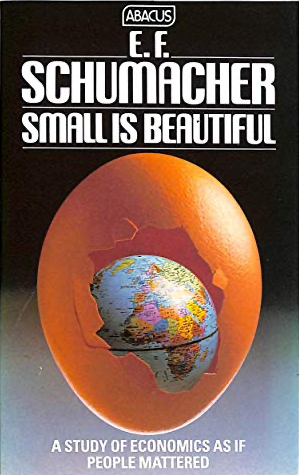
“In the affairs of men, there always appears to be a need for at least two things simultaneously, which, on the face of it, seem to be incompatible and to exclude one another. We always need both freedom and order. We need the freedom of lots and lots of small, autonomous units, and, at the same time, the orderliness of large-scale, possibly global, unity and coordination. When it comes to action, we obviously need small units, because action is a highly personal affair, and one cannot be in touch with more than a very limited number of persons at any one time. But when it comes to the world of ideas, to principles or to ethics, to the indivisibility of peace and also of ecology, we need to recognise the unity of mankind and base our actions upon this recognition. Or to put it differently, it is true that all men are brothers, but it is also true that in our active personal relationships we can, in fact, be brothers to only a few of them, and we are called upon to show more brotherliness to them than we could possibly show to the whole of mankind. We all know people who freely talk about the brotherhood of man while treating their neighbours as enemies, just as we also know people who have, in fact, excellent relations with all their neighbours while harbouring, at the same time, appalling prejudices about all human groups outside their particular circle.
“What I wish to emphasise is the duality of the human requirement when it comes to the question of size: there is no single answer. For his different purposes man needs many different structures, both small ones and large ones, some exclusive and some comprehensive. Yet people find it most difficult to keep two seemingly opposite necessities of truth in their minds at the same time. They always tend to clamour for a final solution, as if in actual life there could ever be a final solution other than death. For constructive work, the principal task is always the restoration of some kind of balance. Today, we suffer from an almost universal idolatry of giantism. It is therefore necessary to insist on the virtues of smallness — where this applies. (If there were a prevailing idolatry of smallness, irrespective of subject or purpose, one would have to try and exercise influence in the opposite direction.)
“The question of scale might be put in another way: what is needed in all these matters is to discriminate, to get things sorted out. For every activity there is a certain appropriate scale, and the more active and intimate the activity, the smaller the number of people that can take part, the greater is the number of such relationship arrangements that need to be established. Take teaching: one listens to all sorts of extraordinary debates about the superiority of the teaching machine over some other forms of teaching. Well, let us discriminate: what are we trying to teach? It then becomes immediately apparent that certain things can only be taught in a very intimate circle, whereas other things can obviously be taught en masse, via the air, via television, via teaching machines, and so on.
“What scale is appropriate? It depends on what we are trying to do. The question of scale is extremely crucial today, in political, social and economic affairs just as in almost everything else. What, for instance, is the appropriate size of a city? And also, one might ask, what is the appropriate size of a country? Now these are serious and difficult questions. It is not possible to programme a computer and get the answer. The really serious matters of life cannot be calculated. We cannot directly calculate what is right; but we jolly well know what is wrong! We can recognise right and wrong at the extremes, although we cannot normally judge them finely enough to say: ‘This ought to be five per cent more; or that ought to be five per cent less.’
“Take the question of size of a city. While one cannot judge these things with precision, I think it is fairly safe to say that the upper limit of what is desirable for the size of a city is probably something of the order of half a million inhabitants. It is quite clear that above such a size nothing is added to the virtue of the city. In places like London, or Tokyo, or New York, the millions do not add to the city’s real value but merely create enormous problems and produce human degradation. So probably the order of magnitude of 500,000 inhabitants could be looked upon as the upper limit. The question of the lower limit of a real city is much more difficult to judge. The finest cities in history have been very small by twentieth-century standards. The instruments and institutions of city culture depend, no doubt, on a certain accumulation of wealth. But how much wealth has to be accumulated depends on the type of culture pursued. Philosophy, the arts and religion cost very, very little money. Other types of what claims to be ‘high culture’ — space research or ultra-modern physics — cost a lot of money, but are somewhat remote from the real needs of men.
“I raise the question of the proper size of cities both for its own sake but also because it is, to my mind, the most relevant point when we come to consider the size of nations.
“The idolatry of giantism that I have talked about is possibly one of the causes and certainly one of the effects of modern technology, particularly in matters of transport and communications. A highly developed transport and communications system has one immensely powerful effect: it makes people footloose.”
— from E. F. Schumacher, Small Is Beautiful: Economics As If People Mattered (Harper & Row, 1973)